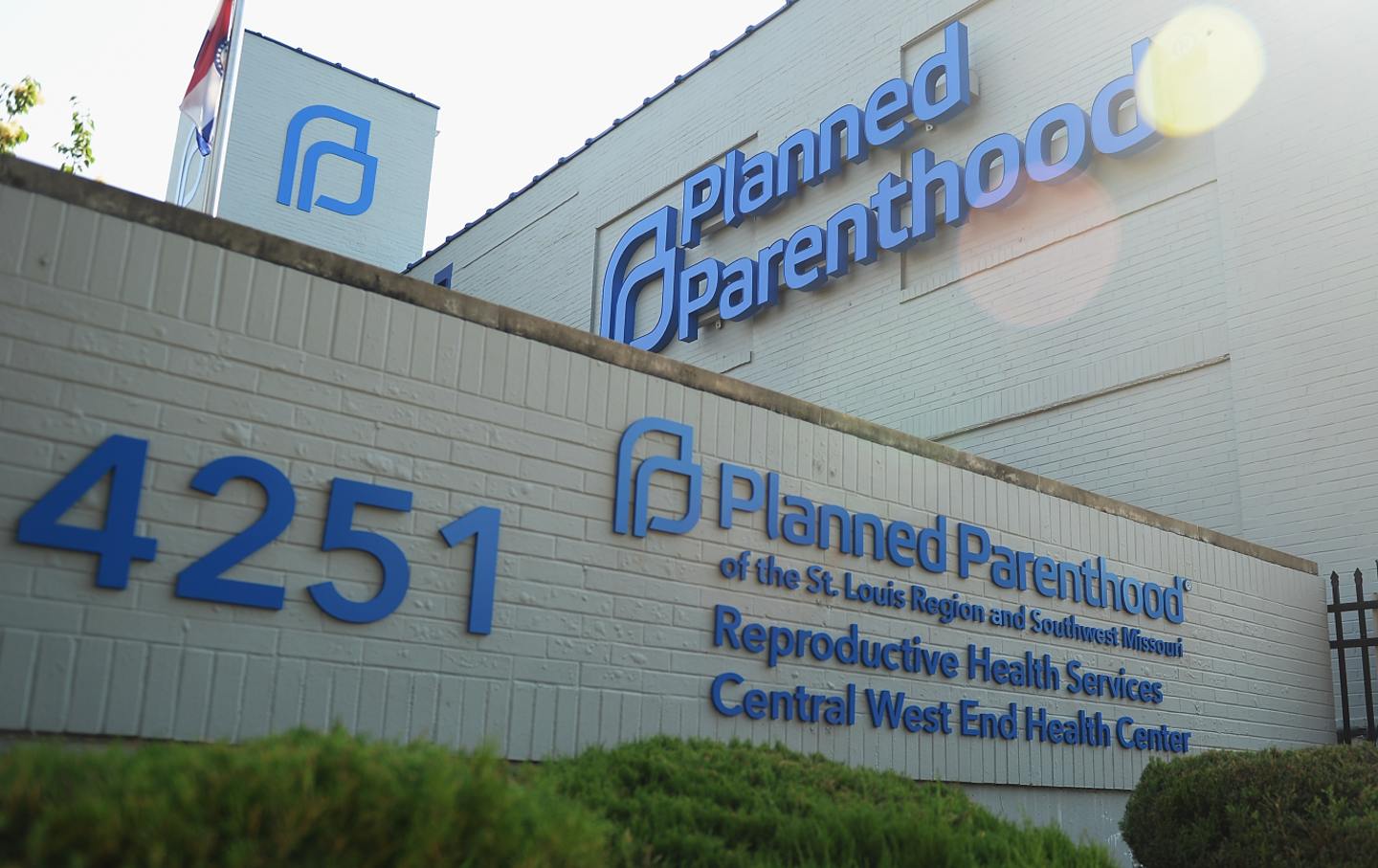December 24, 2024
The case, just added to the Supreme Court’s docket, concerns whether Medicaid can be used to pay for the services of health care providers who also perform abortions.

Exterior view of the Center for Reproductive Health in St. Louis, Missouri
(Michael Thomas/Getty Images)
Last week, the Supreme Court added two additional cases to the term. You’ve probably already heard about the first: the court plans to give TikTok one last chance to save itself and consider the company’s case in an accelerated mode on January 10. The court can move incredibly fast when money is at stake.
With all due respect to TikTok—the news platform increasingly chosen by America’s youth—the second case is more important. This case, Kerr v. Planned Parenthoodis studying whether Medicaid funds can be used to pay for services at Planned Parenthood. If the court says no, it will limit access to contraception and gynecological care for millions upon millions of impoverished Americans.
In this case, it is not about abortion. Readers familiar with the dystopian state of reproductive rights in this country know that the government already prohibits the use of Medicaid to fund abortions. We have The Hyde Amendment to thank for it, as well as various state laws reiterating the harms of this amendment.
But Planned Parenthood is more than an abortion clinic. The organization provides a wide range of health services to women and girls, including gynecological care, cancer screening and, very importantly, various forms of contraception.
In 2018, South Carolina Governor Henry McMaster banned the use of Medicaid funds for payment anything at Planned Parenthood clinics in your state. He said that “the payment of taxpayer funds to abortion clinics for any purpose results in the subsidization of abortion and the deprivation of the right to life.” I note that McMaster’s argument seems to forget that women who need medical care also have a “right to life.”
McMaster’s rule can be read incredibly broadly. Many poor women in many states obtain contraception from clinics that also perform abortions or from organizations that support abortion in states where it is still legal. If Medicaid dollars cannot be used at any of these clinics, access to contraception could be severely limited in states that follow South Carolina’s example.
Planned Parenthood sued and won in state court, arguing that the McMaster rule violated the Affordable Care Act. The law allows the federal government, not the states, to determine how Medicaid funds can be used, and Congress has not barred Planned Parenthood clinics from using those funds. Now the question of whether private entities, like the plaintiffs in the case, have standing to sue to force the state to enforce the Affordable Care Act is at the heart of South Carolina’s appeal to the Supreme Court.
I cannot stress how much is at stake in this case. Let’s say Congress passes a law that specifies the use of money in a certain way. Then let’s say that the state decided to ignore the law and prevent the money from being used for its intended purpose. Who has the right to sue the state for its non-compliance? If South Carolina wins, the answer might be “only Congress can sue to force the state to follow the law.” If that’s the case, what are we going to do in a situation where Congress (because of the dominant party, desire for culture war, or general incompetence) doesn’t sue? This could lead to states being able to choose which federal mandates are “real” and which can be safely ignored.
A recent Supreme Court case showed how the court can — or should — think Kerr v. Planned Parenthood. In 2022, the court decided Health and Hospital Corporation of Marion County v. Talewski. The case asked whether individuals could sue the state of Indiana for failure to enforce the Federal Nursing Home Reform Act. The court said yes, 7-2, with Ketanji Brown Jackson writing the majority opinion for the court and only Clarence Thomas and Sam Alito dissenting. Amy Coney Barrett wrote a concurring opinion in the case.
But this case did not touch on the issue that Barrett believes is causing Jesus’ anger. In this case, we simply don’t know whether Republican courts will rule that South Carolina must stick with the Affordable Care Act, even if it means allowing poor women birth control.
We’ll find out soon enough. Arguments in this case have not yet been scheduled, but we can expect them in March or April with a decision in June.
If I had to guess, I’d imagine a similar 7-2 majority Talewski stick together and order South Carolina to enforce the Affordable Care Act. But this time, Barrett will write the majority opinion. She will express this opinion to the Republican Congress exactly what they should do to amend the Affordable Care Act to allow states to ban women from using it to access contraception.
The fight to restore abortion rights has been lost for now. The fight for protection of contraceptive rights is already underway. A majority of white women voted for it.
With a hostile new administration, a vast infrastructure of courts and judges waiting to turn “freedom of speech” into a nostalgic memory, and outdated newsrooms that are quick to abdicate their responsibility to produce accurate, fact-based reporting, the independent media is short on work.
U Nationwe are preparing for an uphill battle, fighting for truth, transparency and intellectual freedom, and we cannot do it alone.
This month, every gift Nation receives by December 31 will be doubled, to $75,000. If we achieve the full match, we’ll start 2025 with $150,000 in the bank to fund political commentary and analysis, in-depth reporting, sharp media criticism, and the team that makes it all possible.
When other news organizations silence their dissent or soften their approach, Nation remains dedicated to speaking truth to power, engaging in patriotic dissent, and empowering our readers to fight for justice and equality. As an independent publication, we are not dependent on stakeholders, corporate investors or government influence. Our allegiance is to facts and transparency, to our abolitionist roots, to the principles of justice and equality – and to you, our readers.
In the coming weeks and months, the work of free and independent journalists will matter more than ever before. People will need access to accurate reporting, critical analysis and deep understanding of the issues they care about, from climate change and immigration to reproductive justice and political authoritarianism.
By standing with Nation nowyou are investing not only in independent journalism based on the truth, but also in the opportunities that truth will create.
Opportunity galvanized public. About a fairer society. Significant changes, and more radical, liberated tomorrow.
In solidarity and in action,
editor, Nation
More from Nation

After Columbine and Sandy Hook, after the AME Church in Charleston and the Tree of Life Synagogue in Pittsburgh, we stopped saying, “This can’t happen here.” And then it worked.

2025 will undoubtedly be a difficult year, but these visionaries give us hope in this uncertain time.

A look at UnitedHealthcare’s CEO’s social media accounts shows what Americans tend to turn to when their government doesn’t give them enough options.

In the abstract, “government” can seem inefficient and wasteful. But Americans will miss him when he’s gone.



